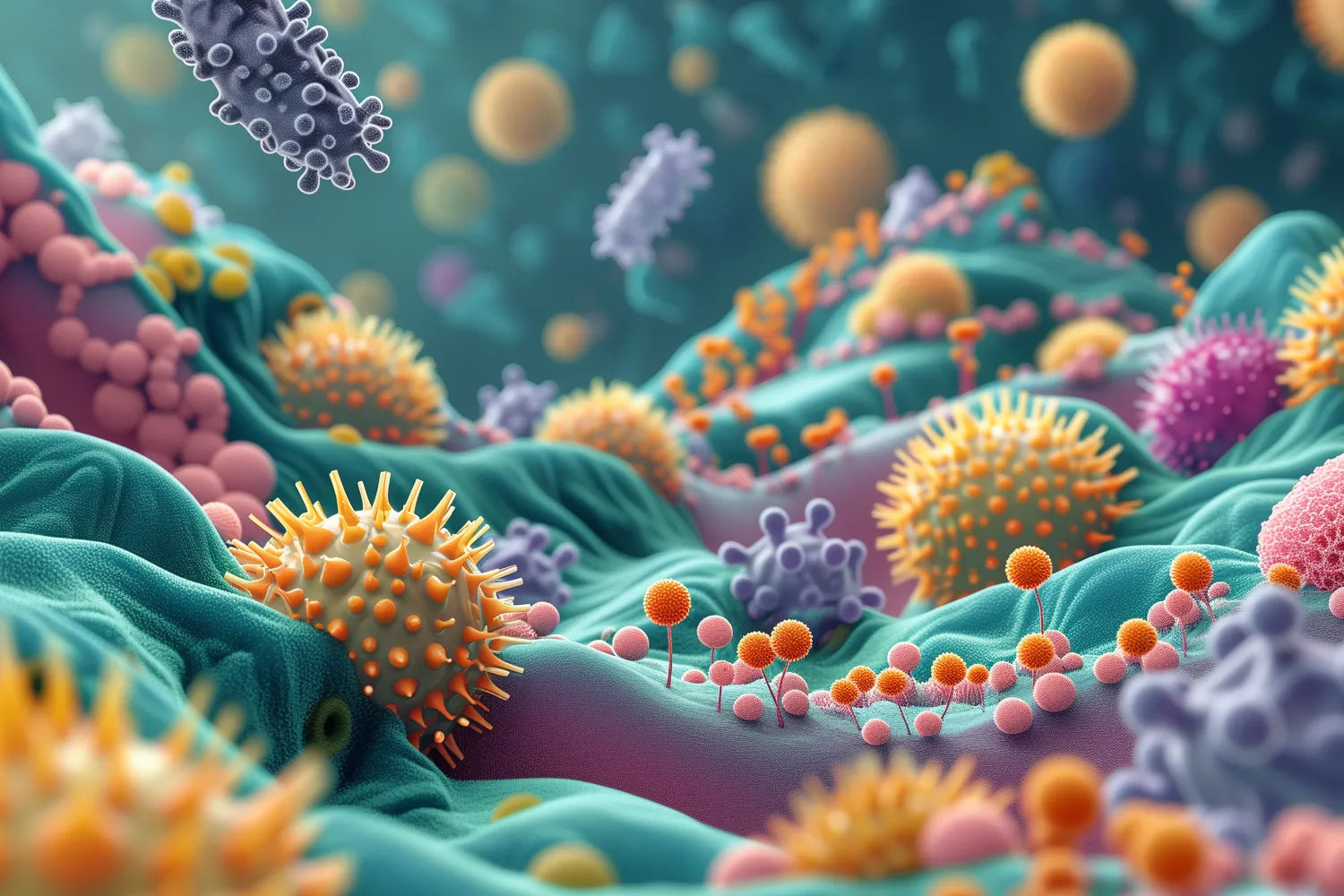
Dr. Eric Venn-Watson’s Highlights
-
Omega-3 fish oil capsules are popular among many adults, but they come with gastrointestinal side effects.
There is another fatty acid supplement available that does not cause these side effects and has more health benefits than omega-3.
Taking fatty15 once per day can help support overall homeostasis and balance in your body.
We don’t like to talk about it, but no one likes irregularity. Whether you find your bowels a bit overactive or underactive, you just want to figure out the root cause of the issue so you can get back to feeling better. Constipation can be particularly troublesome and leave you feeling gassy, bloated, and very uncomfortable.
Many times, the source of discomfort comes from a change we’ve made to our diets, routines, or to our supplement stack. These are logically places to look when something isn’t functioning properly, and if you’ve recently begun a new supplement, like fish oil, you might wonder if the constipation is linked.
Omega-3 fish oil supplements are widely used because of their link to improved cardiovascular health. However, that doesn’t mean they don’t come with side effects, and it doesn’t mean that everyone needs to take them. In fact, there may be cause for you to consider taking a different fatty acid supplement altogether.
We’ll explore fish oil’s link with digestive issues, and talk about another fatty acid that is much easier on your digestive system. Additionally, in extensive studies, this newly discovered as essential fatty acid has more clinically relevant benefits and is safer for our cells than omega-3.
Omega-3: Just the Facts
Omega-3 has been the ruling fatty acid of the supplement world for a long time. More than 90 years ago, a husband and wife team of scientists discovered that some fatty acids were essential to our well-being. Essential means we need a particular nutrient to thrive but cannot readily make it on our own.
Interestingly, only one omega-3 fatty acid (ALA) is actually essential. The other two main types of omega-3 fatty acids, EPA and DHA are not generally recognized as essential, although most omega-3 supplements contain them.
What Does Omega-3 Do?
Omega-3 has been linked to increased cardiovascular health, brain and eye development in babies and children, and the health of our cell membranes. A deficiency in omega-3 is rare, but many people take omega-3 to support their Health.
The American Heart Association links DHA and EPA with lower blood triglyceride levels, but they note that consumption of fatty fish is the best way to boost your levels of these fatty acids.
How Much Omega-3 Do I Need?
Most adults in the United States get plenty of omega-3 through their dietary consumption of foods like salmon, mackerel, tuna, and other fatty fish or plant-based resources like flax seed, chia seeds, and walnuts. The recommended daily amount of ALA for non-pregnant adults over age 18 is 1.1 g per day for women and 1.6 g per day for men.
Do Fish Oil Supplements Work?
If you take a fish oil supplement, you should know that they come with some side effects that may make them a non-viable option for some. First, fish oil supplements usually contain a blend of oils from different fish that often include ALA, DHA, and EPA.
You might be wondering why they’d include DHA or EPA since neither of those omega-3s are essential, and that’s a good question. In most of the broad, randomized, placebo-controlled clinical trials, the heart-protective effects and health benefits associated with omega-3 come from pure EPA without DHA.
Most experts, including the National Institutes of Health (NIH), recommend getting the omega-3s you need through your diet and not through fish oil supplements. The body absorbs omega-3 from food more efficiently than from a supplement, which is why you typically see supplements that contain large quantities of omega-3.
Do Fish Oil Supplements Have Side Effects?
Fish oil supplements, and omega-3 in general, do have risks and side effects. In fact, taking too much omega-3 can lead to negative health risks. You may begin to bruise easily, experience thinning of the blood, and have issues with blood clotting if you were to become injured.
In addition, many of the fish oil supplements you find on store shelves aren’t fresh. An independent study found that one in 10 bottles of fish oil supplements were rancid on store shelves before they were even purchased. Other studies have found that up to 50% of fish oil supplements have oxidation levels above international safety standards. If the oil is rancid in the capsules, it will be rancid in your body.
This rancidity occurs because omega-3 is a polyunsaturated fatty acid that is liquid at room temperature, which means it can go rancid, just like cooking oil that sits in your pantry too long. Fish oil capsules are also known for having a terrible, fishy aftertaste. Even so-called “burpless” formulas still have an aftertaste that is hard to eliminate.
Does Fish Oil Cause Constipation?
Fish oil supplements do have a link to digestive upset, but diarrhea is often the most common side effect. Loose stool is regularly associated with fish oil supplementation, but this side effect most often dissipates after regular use. If you are experiencing constipation, it could be from the fish oil, but it isn’t likely.
Instead, constipation that troubles you on an infrequent basis is typically the result of a change in your diet, less water consumption, a minor illness, or a change to your exercise routine.
A Better Fatty Acid
Omega-3 has enjoyed its time in the spotlight, but a newer, more effective fatty acid has been discovered that is safer, more effective, and doesn’t come with unwanted fishy side effects.
C15:0: The New Fatty Acid
More than 90 years later, a new husband and wife team discovered a new essential fatty acid known as pentadecanoic acid, or C15:0. While researching longevity in bottlenose dolphins, they discovered that dolphins with a higher circulating level of this fatty acid experienced fewer occurrences of age-related illnesses.
They took their research further, and as it turns out, the same age-preserving benefits can be enjoyed by humans, too. C15:0 is now recognized as the third essential fatty acid and mounting science supports that it is more beneficial for our health than omega-3 fatty acids.
C15:0 vs. Omega-3
Pitted against the purest and most effective form of omega-3, C15:0 was shown to be better, broader, and safer for our health:
- Better. C15:0 has over 26 more clinically relevant benefits than omega-3.
- Broader. When compared to omega-3, C15:0 repaired 2.5 times as many cell types, including immune, gut, heart, and joint cells.
- Safer. Among the 12 cell types tested, C15:0 was safe for all of them. Omega-3 was toxic to 4 out of 12 cell types, including lung and blood vessel cells.
In addition, C15:0 isn’t subject to lipid peroxidation (aka rancidity) because it is a solid at room temperature.
What C15:0 Does In Our Bodies
C15:0 is essential and plays many roles in our bodies. Essential means that our bodies can’t make enough of it to support our health and we must get the nutrient through our diet.
C15:0 is an odd-chain saturated fatty acid that is required by our bodies to keep our cells healthy. People with low levels of C15:0 frequently have poorer heart, liver, and metabolic health, and experience accelerated aging.
C15:0 works by:
- Keeping cell membranes strong. Like omega-3, C15:0 integrates into cell membranes, but because it is a strong, sturdy fatty acid, it can improve and strengthen them by up to 80%.
- Improving mitochondrial function. Poorly functioning mitochondria in the cells can lead to a reduction in cellular function and an increase in cellular peroxidation. In studies, C15:0 reduced cellular peroxidation and increased cellular ATP levels by 350%.
- Lowering bad LDL cholesterol
- Improving the gut microbiome
C15:0 even targets six of the hallmarks of aging identified by researchers as the basis of why our bodies age. To protect your cellular health and support your metabolic health, ensuring you’re getting enough C15:0 is an important step. The truth is, most of us may not be getting enough.
Am I Deficient in C15:0?
A significant peer-reviewed publication was recently released regarding a newly discovered nutritional deficiency syndrome known as Cellular Fragility Syndrome, which is due to C15:0 nutritional deficiencies. It's a substantial development because nutritional deficiency syndromes — such as those related to vitamin C resulting in scurvy, or vitamin D leading to rickets — are seldom uncovered and when found, they can be easily prevented and treated
The recently published work elaborates on the consequences of C15:0 deficiency, an essential fatty acid. Insufficient amounts can lead to cellular weakness and initiate a process known as ferroptosis. Ferroptosis can accelerate poor metabolic, liver, and heart health and even accelerate aging.
On the bright side? This study, validated by the peer-review process and published in the scientific journal Metabolites, shows that preventing and treating C15:0 deficiencies reinforces cells, counteracts ferroptosis, decelerates cellular aging, and safeguards our metabolic, liver, and heart health.
Even more encouraging? There are measures to support optimal C15:0 proportions that can promote an even healthier and prolonged life.
The only way to know for certain is by ordering the fatty15 C15:0 at-home test or having your doctor perform a blood test. Additionally, you can determine the result of increasing your C15:0 levels by monitoring your complete blood count, fasting lipid panel, and liver enzymes.
C15:0 levels should be above 0.2% of your total fatty acids to prevent nutritional deficiencies and Cellular Fragility Syndrome. It’s worth noting that in blue zones (where people consistently live to be 100), C15:0 levels usually measure between 0.4% and 0.6% of total fatty acids.
Why a Supplement Is Best
The researchers who discovered C15:0 understood that a pure powder, highly bioavailable supplement would be an ideal way to increase our circulating levels of this essential fatty acid. Therefore, they developed fatty15, the first and only supplement that contains the pure powder, bioavailable, vegan-friendly, and award-winning version of C15:0 known as FA15™.
There are a few reasons why taking a supplement to obtain this essential fatty acid may be beneficial.
- First, it's made ready to absorb. In milk (and other foods), C15:0 is attached to branches of lipids called triacylglycerides, aka triglycerides. That means our gut has to use digestive enzymes to break down these triacylglycerides to release C15:0 as a free fatty acid. Once C15:0 is released, it is ready to be absorbed. These multiple steps can make our absorption of C15:0 from foods less efficient. In contrast, FA15 in fatty15 is our proprietary pure, powder C15:0 ingredient already in free fatty acid form. Less work for the gut, more good C15:0 for our bodies.
- No unhealthy fat. Fatty15 is not mixed with bad saturated fats. While the good C15:0 fatty acid is present in whole-fat dairy products in trace levels, there are much higher levels of “bad” even-chain saturated fatty acids that continue to be associated with poorer health. Fatty15 provides just the good fat without the bad fats.
- It skips the cows and calories. No cow involvement, no excess calorie consumption. The movement to more plant-based milk and meat replacements are driven by a desire for more animal-free products, as well as a desire to veer from cows and cattle because of concerns around methane production but plant-based milk replacements lack C15:0 altogether. Fatty15 offers a vegan-friendly C15:0, with only one calorie per dose.
Fatty15 provides the essential C15:0 you need and nothing you don’t. The best part? There’s never a fishy aftertaste and its easy on your digestive system. In fact, C15:0 helps regulate and promote total body homeostasis.
Fatty15: A Better Choice
Omega-3 fish oil supplements are ‘fishy’ and can lead to disruptions in your digestive system. Fatty15 is much easier to take and as a bonus, has more benefits for your cells and your long-term health. Fatty15 is a key way to strengthen your cells, improve your metabolic, liver and heart health, and protect against age-related breakdown.
Sources:
Omega-3 Fatty Acids - Consumer| ODS NIH.gov
Revealed: many common omega-3 fish oil supplements are ‘rancid’|The Guardian.com

Eric Venn-Watson M.D.
CEO, Co-Founder
Senior Scientist, Co-Founder
Eric is a physician, U.S. Navy veteran, and Co-founder and COO of Seraphina Therapeutics. Eric served over 25 years as a Navy and Marine Corps physician, working with the special forces community to improve their health and fitness. Seraphina Therapeutics is a health and wellness company dedicated to advancing global health through the discovery of essential fatty acids and micronutrient therapeutics.
You May Also Like...
10 Foods Good for Your Liver: The Ultimate Guide
Your liver does a lot for you. If it had a voice of its own, it might ask you to eat more veggies and cut back on your Old Fashioneds. Unfortunately, the liver doesn’t receive a lot of attention until...
How To Improve Your Gut Microbiome: 6 Tips
Interested in how to improve your gut microbiome? We’ve got six tips to help your gut thrive and improve your overall digestion.


